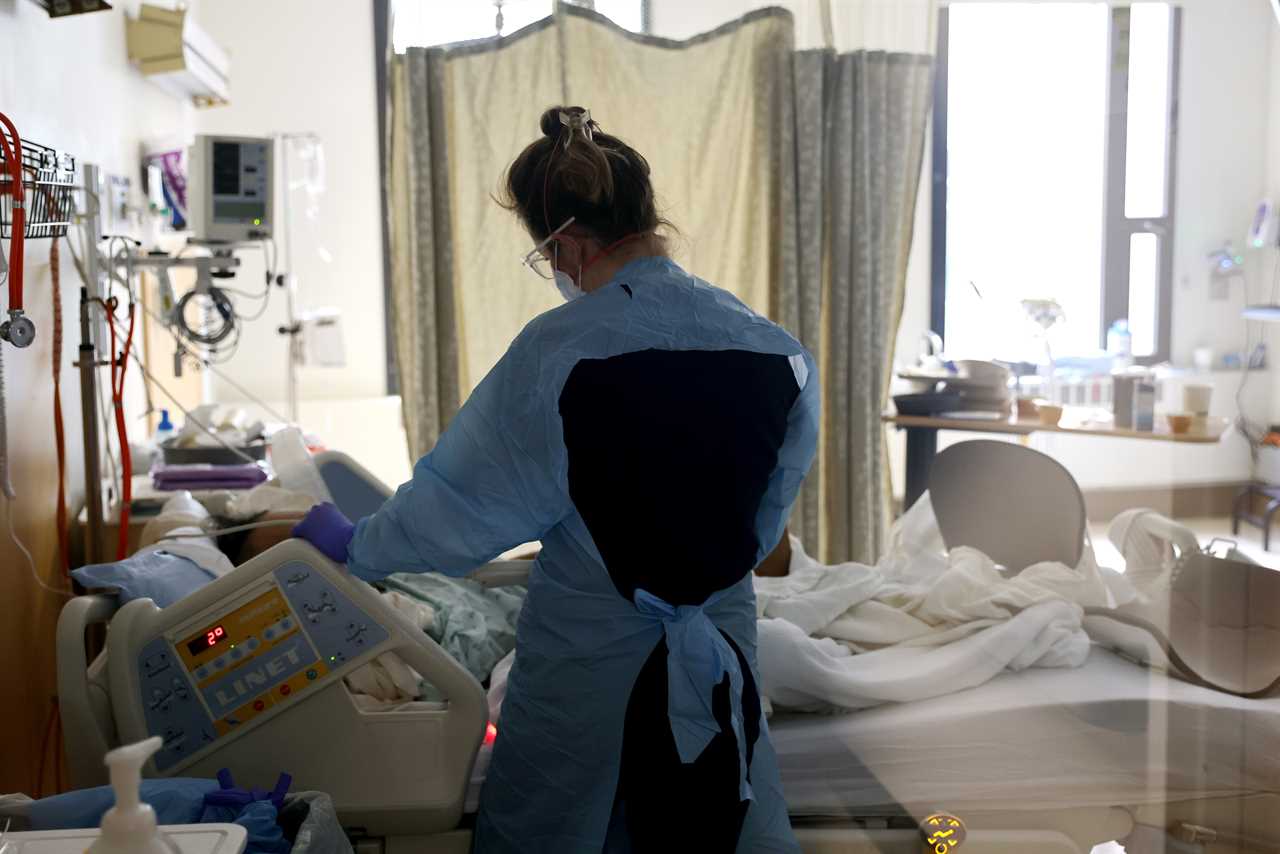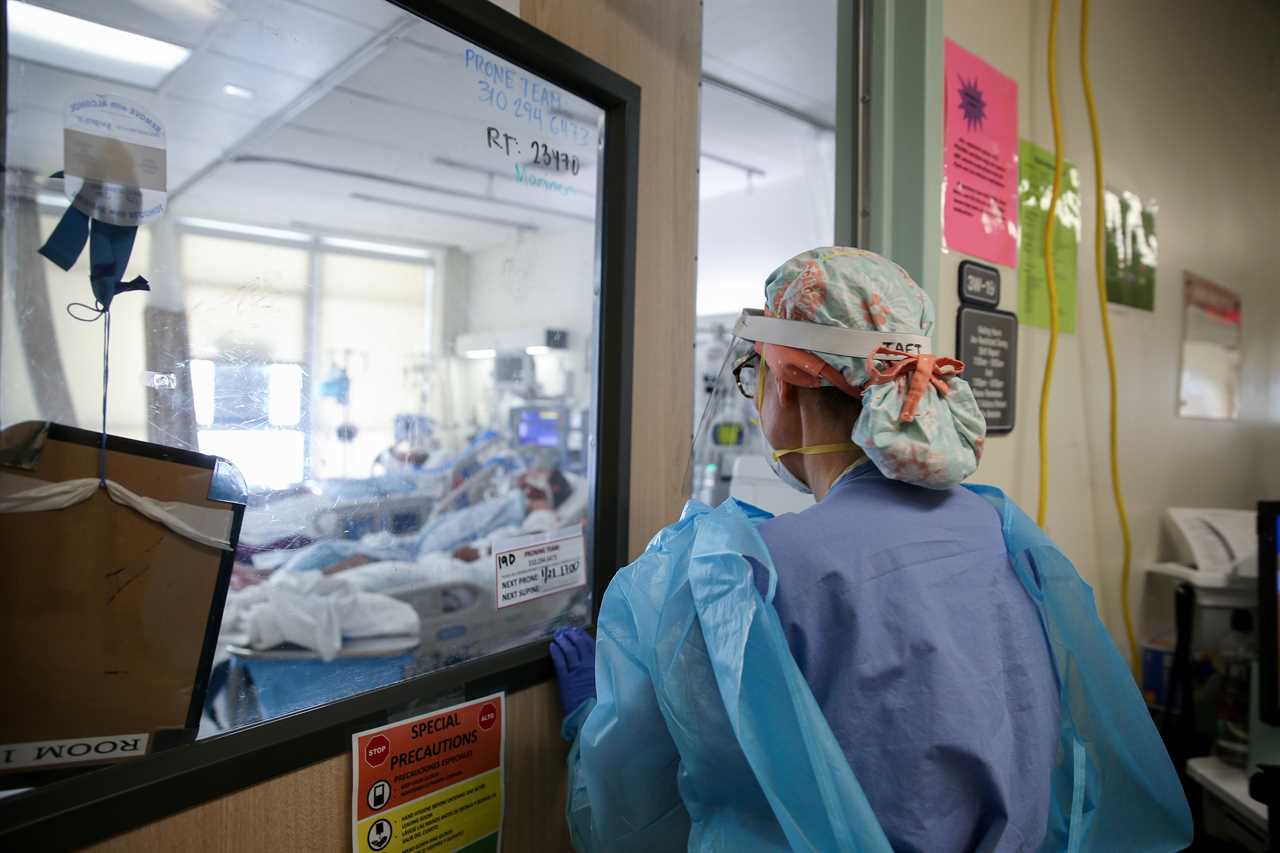
Hospitals across the country are grappling with widespread staffing shortages, complicating preparations for a potential Covid-19 surge as the BA.5 subvariant drives up cases, hospital admissions and deaths.
Long-standing problems, worker burnout and staff turnover have grown worse as Covid-19 waves have hit health care workers again and again — and as more employees fall sick with Covid-19 themselves.
Hospitals are coping, as the most transmissible variant to date sweeps the country, by making compromises. They’re shifting staff between departments, handling longer emergency room waits, and even eliminating routine Covid testing. They’re seeking a new balance, recognizing that they cannot sustain the state of vigilance forever that marked the first two years of the pandemic.
“We had to ramp up during surges and then try and figure out, ‘Do we keep people or do we let them go when we're not surging?’” said Julie Hirschhorn, director of molecular pathology at the Medical University of South Carolina in Charleston. “The surges tend to be just far enough apart to not know what to do … It's a hard new normal.’”
The current wave, in which the new number of patients hospitalized with Covid-19 has risen more than 40 percent in the last month, is also putting fresh stress on facilities as federal funding for the pandemic response is running out, leaving some with less flexibility to hire more staff if they need to.
In March, a funding deal to cover part of the White House’s $22.5 billion request fell apart because Democrats in Congress objected to repurposing unspent funds promised to the states earlier in the pandemic, while Republicans said they needed an accounting of the $6 trillion Congress appropriated for pandemic relief in past funding bills before approving new money.
“There is growing concern that this money has run out,” said Nancy Foster, vice president for quality and patient safety policy at the American Hospital Association. “It's not really getting sufficient attention.”
As of July 22, hospitals in nearly 40 states reported critical staffing shortages, while hospitals in all 50 states said they expected to within a week.
Several states where Covid-19 case numbers are rising have big and growing problems, though factors beyond Covid are involved.
In California, for instance, only eight hospitals described their staffing shortage as critical as of July 22, but 118 expected to within the week. In Louisiana, only one hospital reported a critical shortage last week, but 46 expected to have one by this week. More hospitals were also expecting shortages in Alabama, Florida, Kentucky, New Mexico, Tennessee and West Virginia — all states with rising cases counts.
“While we have previously experienced staffing shortages, we're keenly aware of the staffing shortages at virtually every kind of position within the hospital right now,” said Foster. “If we have a large influx of Covid patients, it will be much more challenging to surge to meet those demands than ever before.”
Chronic shortages in hospital staff will continue to be a long-term problem, administrators said, because even vaccines that have proven highly effective at preventing serious illness are not keeping everyone out of the hospital. There’s also Americans’ deepening resistance to mitigation measures like social distancing and masking, and public officials’ unwillingness to ring the alarm during a wave in which fewer people are getting seriously ill and dying than during previous ones.
Hospital ICUs are not inundated with Covid-19 patients as they were in earlier waves, and average daily deaths are hovering around 350, according to the Centers for Disease Control and Prevention, far below the thousands of Americans dying each day in past peaks.
But serious strains on the health care system persist without those grim tolls.
“I don’t think people appreciate the ramifications for allowing us to transmit the virus almost willy-nilly now,” said David Wohl, the infectious diseases expert leading the Covid-19 response at UNC Health in North Carolina. “If there are supply chain issues, if there are delays in getting services, or if people say, ‘Well, I'm understaffed, I can't do it,’ it's because of the pandemic.”
‘Robbing Peter to pay Paul’
Staffing shortages at hospitals — from nurses to physicians to medical laboratory technicians — existed before SARS-CoV-2, the result of both aging in the health care workforce and an aging population at large that is driving up demand for care.
The pandemic created a kind of domino effect in the medical community, said Sherry Polhill, associate vice president of hospital laboratories, respiratory care and pulmonary function services at UAB Medicine in Birmingham, Ala.
It prompted older workers to leave their jobs sooner and created a boom in the lucrative traveling medical professional industry that lured people away from their staff jobs.
“You've got this vacuum of vacancies that you need to backfill and you can't do that easily,” Polhill said, adding that it could take years to fill the open positions she has in her labs.
The shortfall is hitting hospitals — and their patients — in different ways as BA.5 has proven capable of evading immunity and become the dominant strain in the country.
In North Carolina, where cases are up nearly 20 percent over the last two weeks, UNC Health is struggling to meet rising patient demand for monoclonal antibody treatments.
Hospitals are still providing the antibody treatment to those on medications that might interact negatively with a simpler therapeutic, Paxlovid. Unlike Paxlovid, a pill that can be taken anywhere, monoclonal antibodies are given by infusion, a labor intensive process that requires careful infection control to treat patients at infusion centers that also treat immunocompromised individuals.
To make that work, said Wohl, the hospital has to borrow staff from other departments.
“We have to rob Peter to pay Paul,” he said. “If you have people working in an infusion center doing this, what was their day job before Covid? Some of them were working in the emergency room. Some of them were working in the operating room. You just can't pull people from these other critical functions and have them always working elsewhere.”
Next door in South Carolina, staffing shortages at the Medical University of South Carolina have already prompted the hospital to stop testing all inpatients for Covid-19 as it did earlier in the pandemic.
The facility received money from a Covid-19 relief law Congress passed in March 2020 to build up its testing capacity with new equipment and staff.
Now that money has started to dry up, and Hirschhorn has had to cut back on shifts and employees. Her lab, one in a network of them in the hospital, had 44 staff and contract workers at its pandemic peak, but just 10 full-time staff today. Its Covid-19 testing capacity has declined from about 3,500 per day to 1,500.
The decision to halt routine Covid testing has helped keep the lab from becoming overwhelmed, even as the number of people hospitalized with Covid has risen 34 percent in South Carolina the last two weeks. But Hirschhorn said it makes her uneasy to know that she no longer has the resources to ramp back up if she needs to.
“We're all trying to figure out what does our lab look like now, and what we can do to help prepare ourselves for another surge, knowing that we won't have the same staffing that we had in other surges,” she said. “We’re flying blind.”

Pandemic fatigue
That anxiety is widespread in hospitals, where the pandemic has exacerbated staffing shortages that predate it.
“Medical lab scientists are unhappy right now,” said Susan Harrington, a microbiologist at the Cleveland Clinic and chair of the American Society for Clinical Pathology’s Laboratory Workforce Steering Committee. “They are working too hard, and they’ve been working too hard for too long.”
“What is the end of this?” she asked. “I don’t really quite know the answer.”
Though hospital labs are, broadly speaking, far more prepared to handle this wave of cases than they were in 2020, the Medical University of South Carolina is not alone in ending testing of all inpatients for Covid-19 due to staffing, said Jonathan Myles, chair of the College of American Pathologists’ Council on Government and Professional Affairs.
A lack of local testing options creates a greater danger to patients and the community, he said, particularly in rural facilities operating in economically disadvantaged areas. “They are operating on a shoestring,” he said. “If you limit testing in rural settings, you exacerbate the inequity of care.”
Large urban hospitals can be better positioned to juggle during periods of high transmission, but with more employees calling in sick and more patients testing positive they, too, are under pressure.
In Los Angeles County, where the number of patients hospitalized with Covid-19 has risen dramatically since May despite the area’s high vaccination rate, the Harbor-UCLA Medical Center has had to find ways to manage.
“People are getting Covid left and right,” said Anish Mahajan, CEO and chief medical officer at the facility.
So far, the hospital has coped during this uptick in cases, he said, with some longer waiting times in the emergency room due to staffing shortage and more patients. The hospital may have to again prioritize urgent care cases if things get worse.
The only real way to end the uncertainty is to stop the virus, through vaccination and by taking measures that stop its spread, he said, like putting masks back on when transmission is high.
“The more the virus transmits in our world, the more likely we're going to see the generation of future variants take hold,” said Mahajan. “Maybe this variant doesn't cause that many folks to end up sick in the hospital. But we don't know what the next variants might do.”
----------------------------------------
By: Krista Mahr
Title: Hospitals struggle with staff shortages as federal Covid funds run out
Sourced From: www.politico.com/news/2022/07/25/hospitals-staff-shortages-covid-funds-00047539
Published Date: Mon, 25 Jul 2022 03:30:00 EST






